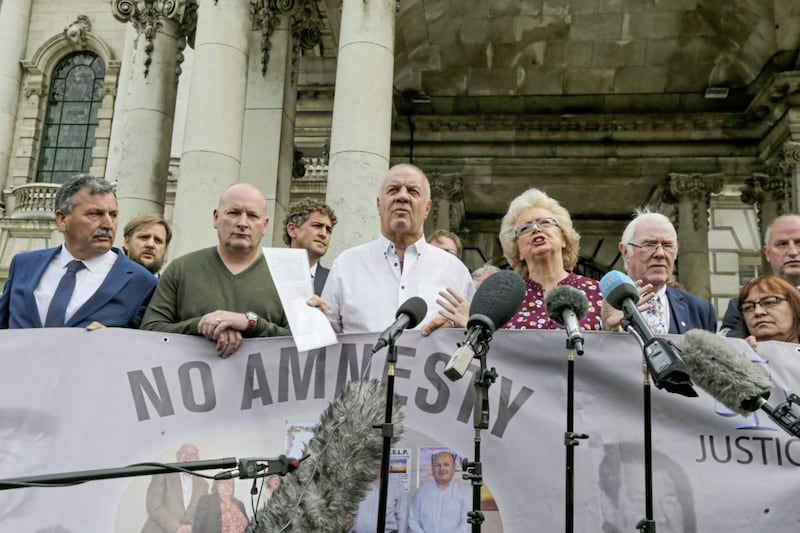MORE than a third of people would support ‘drawing a line under the past’ with a general amnesty for Troubles-related offences, new research shows.
The findings from the Institute of Irish Studies-University of Liverpool/The Irish News survey highlight much greater support for the controversial move among the public than with their political representatives.
Victims' groups, Stormont’s main parties and the Irish government are all opposed to British government proposals to introduce a statute of limitations for Troubles-related prosecutions up to 1998.
Political Correspondent John Manley discusses the results of today's opinion poll with Slugger O'Toole's David McCann and Irish News columnist Mary Kelly
However, the research published exclusively in The Irish News today shows that 40.4 per cent of respondents believe a blanket amnesty is the best way forward. The figure is highest among those who regard themselves as neither unionist or nationalist (48.2 per cent) but lowest among nationalists (37 per cent). Nevertheless, those who support ‘drawing a line under the past’ represent the highest proportion of respondents, with 31.8 per cent of people disagreeing with the move.
Read More:
John Manley: Failure to address past means society more likely to be haunted by it (premium)
Professor Peter Shirlow: The failure to deal with the past is a failure of political leadership (premium)
The same research, conducted between January 24-February 7, also found widespread support for the need to address the past, with more than two-thirds of respondents (68.8 per cent) agreeing that there was a requirement to deal with the legacy of the conflict.
The poll also indicates an acknowledgement across society that all communities were impacted by the Troubles. In all, 85.4 per cent of respondents agree that "all sectors of society were harmed by the legacy of the conflict". This recognition is roughly shared equally by unionists, nationalists and neithers.
In terms of statements of acknowledgement and/or apologies from organisations responsible, more than two-thirds (71.3 per cent) of respondents regard these as significant, while little over one-in-ten (10.1 per cent) either disagree or strongly disagree. There also appears to be healthy support for commemoration and remembering initiatives (62.1 per cent), an annual day of reflection on June 21 every year (62.3 per cent), and a living museum (63.7 per cent).
Opinions appear to differ greatly between nationalists and unionists on a truth recovery process that needs to address the needs of both victims and survivors. A huge majority of nationalists (90.4) per cent advocate truth recovery but this falls to 64.4 per cent among unionists and 69.2 per cent among neithers.
When it comes to trusting the sources of disclosed information in any truth recovery process, the Irish government ranks the highest, marginally ahead of its British counterpart. Trust to disclose information is lowest for paramilitary groups, both loyalist and republican.
Kate Turner, director with Healing Through Remembering, said she felt vindicated by the survey's findings.
"We very much see dealing with the past as being about all of us, so we are encouraged by the level of cross-community support for many approaches," she said.
"The survey reflects what I am hearing but in stronger terms."
Ms Turner said victims found the British government's proposals for a statute of limitations "very hurtful".
"While there is some support for drawing a line under the past, the survey reflects much greater support for the mechanisms contained in the Stormont House Agreement than the British government's command paper," she said.
"The British government claims there is no support for Stormont House but the research contradicts that."
The Healing Through Remembering director said she hoped the survey results would prompt politicians to act.
"What we hope is that the findings give our political leaders the confidence to act," she said.
Professor Peter Shirlow, director of the Institute of Irish Studies, said the finding that more than 80 per cent of respondents acknowledged all communities were harmed by the conflict demonstrated that "society has moved".
"Significant inter-community support also exists for more co-joined ways to remember victims and survivors," he said.
"Out of recognition for victims and survivors and their own experience most agree with prosecutions and truth retrieval processes but few locate faith in these methods in providing families with the information they merit.
"The route of recognition, acknowledgement and even apology is agreed while politics remains out of sync with that hope for developing inclusive ways to end legacy issues."
Read More
- Michelle O'Neill on course to be first minister Protocol matters most to little more than one in 10 unionists
- One-fifth of voters are still undecided
Analysis (premium)
- John Manley: Survey suggests May 5 could turn out to be watershed
- David McCann: When one-in-five are undecided there's plenty to play for
- Mary Kelly: Survey contradicts Jeffrey Donaldson's claims about protocol








